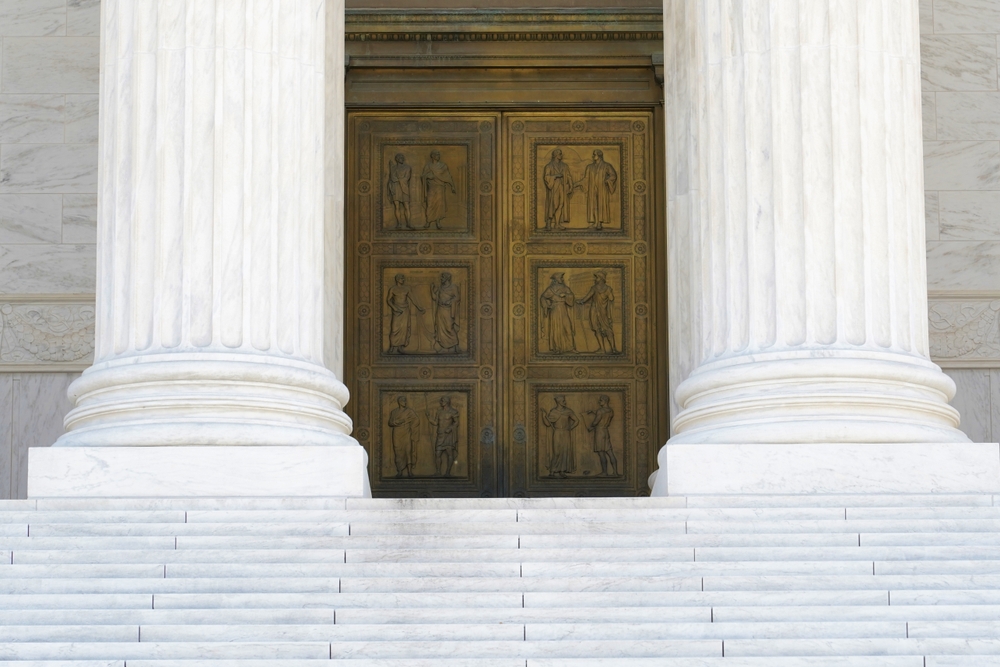
Speaker Trump
Trump could help restore ambition to Congress itself.
Donald J. Trump should seek election in 2028… to the House of Representatives.
Until recently, Trump had refused to squash speculation that he might seek a third presidential term. He referred to the possibility of a third term at a gathering of House Republicans in January. In March, he declared “I’m not joking” about potentially doing so when pressed by NBC’s Kristen Welker. The Trump Organization still sells “Trump 2028” red hats on its website.
Yet Trump finally ended speculation about a third term in an recently aired interview with Meet the Press. He acknowledged that “it’s something that, to the best of my knowledge, you’re not allowed to do. I don’t know if that’s constitutional that they’re not allowing you to do it or anything else.” (The ban is “constitutional,” of course, thanks to the 22nd Amendment, though one House Republican has sponsored a measure to amend the amendment.)
Though he cannot serve a third presidential term, Trump can still run for office in 2028. He is not disqualified from serving in the House of Representatives or the Senate. If he were to be elected to the House, he might help revive our most representative yet anemic institution. That would be as impactful a legacy as any of his policy achievements as President.
Such a scenario would not be unprecedented. John Quincy Adams served in the House of Representatives for nearly 17 years after departing the White House in 1829. Adams’s years of service in the House of Representatives were among the most distinguished of his political career. He emerged as a leader of anti-slavery forces in the House of Representatives, opposing the infamous “gag rule” that tabled incoming petitions regarding slavery. He used parliamentary tactics like the disappearing quorum to oppose pro-slavery measures. He pressed for rules prohibiting policy from being included in appropriations bills – rules which the House adopted in 1835. (He was also a consistent thorn in the side of the Speaker, future President James K. Polk.)
Adams’s impact on the House, in short, was significant and enduring. If Trump were elected to the House of Representatives in 2028, his legacy in Congress could be even more so. Trump’s boldness, ambition, and commanding personality could help restore ambition to Congress itself, reversing the decline of constitutionalism writ large.
Representative Trump’s presence in the House would lead to significant, if unpredictable, changes in how the House functions. He would almost certainly be elected Speaker if Republicans held a House majority, and in any event, his voice would command as much or more attention as the President’s. As students of Congress have long observed, representatives have lost their ambition to legislate because they do not want to make the hard choices and compromises necessary to address major national problems. They would rather pass the buck than be responsible for setting national policies.
The decline of congressional ambition has been catastrophic for our constitutional system. It has led to winner-take-all politics in which the winners of narrow victories in presidential elections make sweeping policy choices without being forced to consider and accommodate their opponents’ views. This has led to a predictable process of overreach followed by backlash and policy reversal, only to see the pendulum swing in the other direction. Most concerning, it has led to popular disillusionment with the inability of our government to produce consensus, bargaining, compromise, and stable policy.
Consider how a Representative Trump could potentially reverse these dangerous trends. He could do so in a variety of ways. Trump would be more inclined to take responsibility than to pass the buck to the President. Yet, because he would not enjoy the relative unity he has experienced in the executive branch, he would have to accommodate the different members representing various interests and opinions if he wanted to get anything done – even if he were chosen to lead the House.
These circumstances could generate real ambition in the legislative branch. Members of Congress must overcome enormous transaction costs to get enough votes to pass legislation. To make the important policy decisions, members of Congress have to really want to make them, since they have to work together to produce a majority consensus. Trump would want to be responsible for making policy, of course, but he could also inspire that desire in other members. The desire to resist and oppose Trump might spur the ambition of his Democratic opponents. Additionally, some Republicans might want to assert their independence from him, allowing for fluid coalitions to potentially form.
It would be a welcome and refreshing change to have a House of Representatives whose ambition actually competed with that of the President. This was James Madison’s hope, of course. He famously wrote that in our system, “Ambition must be made to counteract ambition. The interest of the man must be connected with the constitutional rights of the place.”
Whatever one makes of his other characteristics, it is clear that Trump has ambition. And without a path back to the presidency, that ambition could be connected to the place where he will spend the remainder of his political career.
Someone might contend that Trump’s presence in the House would actually exacerbate Congress’s pathologies rather than reverse them. According to this argument, Trump would increase the members’ tendency to engage in performative politics, to fight and bicker rather than compromise, and to use the institution for individual purposes rather than to work together to address national problems. These are reasonable concerns.
But, in the first place, these problems are already deeply entrenched – it’s hard to see how things could get much worse than they already are. In addition, Trump will almost certainly influence the behavior of members in Congress, even if he is not a part of the body after the 2028 elections. It is naïve to think that he won’t affect Congress after he leaves the presidency, regardless of whether he is a member of the House. In short, Congress is already largely broken. There is not much left to break, and a great deal to repair.
A few logistical issues must be addressed if Trump were to run. First, and simplest, is which district Trump would have to represent. The Constitution requires that a member must “be an inhabitant of that state in which he shall be chosen,” but it does not require members to represent the districts in which they reside. So, Trump would be restricted to running for one of Florida’s House seats, but he would be free to select which of the seats he would run for. (It would be wise for him to run in the district where he resides, even if it is not constitutionally required.)
More complicated are the legal questions swirling around Section 3 of the Fourteenth Amendment, which states that no person can serve as a “Representative in Congress” if they “shall have engaged in insurrection or rebellion” against the United States and previously served as “an officer of the United States.” In Trump v. Anderson, the Supreme Court determined that this provision was not “self-executing,” and Congress had to implement it through legislation. But this decision left several other legal questions unresolved – questions that could resurface if Trump were to run for Congress in 2028.
It may be a sad reflection on the state of our Congress that something this extraordinary should be necessary to revive its ambition. But Congress is a great reflection of the state of our constitutional spirit. In our warped constitutional zeitgeist, Americans believe that if Trump can’t run for a third presidential term in 2028, he has to return to private life. Most Americans can’t fathom a place in our political system for leadership outside the presidency.
Trump could change this by following John Quincy Adams’s example. Though his opponents (and perhaps even some of his supporters) may look forward to the day when Trump is no longer the overwhelming presence that he is right now, it may be more prudent to consider how to use his ambition to strengthen our institutions, especially those in such a sorry state as the Congress.
Joseph Postell is a contributing editor to Civitas Outlook and is an Associate Professor of Politics at Hillsdale College.
Constitutionalism

Amicus Brief: Hon. William P. Barr and Hon. Michael B. Mukasey in Support of Petitioners
Former AGs Barr and Mukasey Cite Civitas in a SCOTUS Brief

Rational Judicial Review: Constitutions as Power-sharing Agreements, Secession, and the Problem of Dred Scott
Judicial review and originalism serve as valuable commitment mechanisms to enforce future compliance with a political bargain.

Supreme Court showdown exposes shaky case against birthright citizenship
Supreme Court will hear challenges to Trump's order ending birthright citizenship, testing the 14th Amendment's guarantee for babies born in America.

Slavery and the Republic
As America begins to celebrate its semiquincentennial, much ink has been spilled questioning whether that event is worth commemorating at all. Joseph Ellis’s The Great Contradiction could not be timelier.

Two Hails For The Chief’s NDA
Instead of trying to futilely plug the dam to stop leaks, the Court should release a safety valve.


.avif)










.avif)



